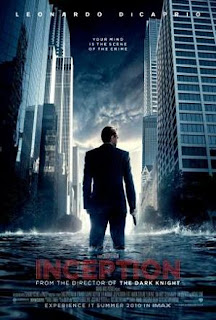Inception
 I've got to hand to the suits at Warner Brothers--Inception may be the most intricately plotted movie ever to be unleashed into the multiplex world. I would wager that most of them that read the script couldn't make heads or tails of it, and the most important words were on the cover page: Screenplay by Christopher Nolan. After The Dark Knight made everybody rich, they would have greenlighted his adaptation of the Topeka white pages.
I've got to hand to the suits at Warner Brothers--Inception may be the most intricately plotted movie ever to be unleashed into the multiplex world. I would wager that most of them that read the script couldn't make heads or tails of it, and the most important words were on the cover page: Screenplay by Christopher Nolan. After The Dark Knight made everybody rich, they would have greenlighted his adaptation of the Topeka white pages.I found much to admire in Inception, and these things are typical Nolan--a great sense of style, stunning photography, state of the art special effects. But I'm the kind of guy who thinks great special effects are a lousy reason to see a movie. Where Inception is lacking is a story that not only is hard to follow, but even if it can be followed one realizes, at the end, that it really wasn't worth following. As with another Nolan picture that I thought was flawed in this way, The Prestige, he has created a terrific puzzle that has very little heart.
I couldn't fully describe the plot even if I tried, but it has to do with entering a person's dreams. Leonardo DiCaprio is an "extractor"--he can enter a person's subconscious through their dreams and learn secrets about that person. He is asked whether the opposite of this, "inception," is possible--that is, to enter a person's dreams and plant an idea. He thinks it can, and takes the job. The target is a businessman, Cillian Murphy.
This might seem to be enough, but Nolan pushes the envelope. He adds the conceit that the dream invaders can go further, to dreams within dreams, like Russian nesting dolls. Thus we have the characters dreaming that they are asleep and having another dream. By the time we're done I counted five levels, each with various characters trying to accomplish things, all while they're asleep. It takes a monumental juggling act to keep it all going, and I tried my best to keep up, but I've got to believe there will be millions of people stumbling out of theaters this weekend mumbling, "What just happened?"
The culprit is the script, which both over explains and also withholds too much information. He uses the familiar gambit of having a new team member brought on board, so they are the surrogate for the audience, getting all the exposition. That person is Ellen Page, who is a college student taught by DiCaprio's mentor (and either his father or father-in-law, I'm not sure which) Michael Caine. She is an "architect," but her valuable skill seems to be drawing mazes, and it's never explained how she applies that skill to what DiCaprio wants. In any event, DiCaprio explains all sorts of rules to her, but there are certain things that are just accepted, such as how the metal briefcases that allow for shared dreaming work, or why another character, played by Tom Hardy, can masquerade as other people inside the dreams. Is this some sort of superpower? Can anyone learn how to do it? He just can.
Inception is full of information overload (and the film seems very long), yet things glide by in a rush, with viewers scrambling to catch up. It isn't helped by having performers with accents. Ken Watanabe is a fine actor, but his accent is thick, and there a few lines where he seemed to be saying something important that I found to be unintelligible. A second viewing with subtitles may clear up some of my problems.
Nolan includes the fanciful conceit that one can be trained to ward off extractors with "antibodies" that look like extras with guns. When they first enter Murphy's dream, the team is beset by machine-gun-toting thugs, and it was then that the Cheap Trick song "Dream Police" started going through my head. There are all sorts of pyrotechnics that I felt made the film routine, especially in a dream in a snow-covered fortress that looked like a bad James Bond film. You would think that with a high concept like this he would have dispensed with the Michael Bay stuff.
There are some effects that are dazzling. A fight scene between Joseph Gordon-Levitt and some dream police in a hallway that is unaffected by gravity recalls Fred Astaire's dance in Royal Wedding, and there is that nifty scene seen in the trailer in which a city folds in on itself. But that's just all window dressing. The heart of this film, which I won't give away but involves DiCaprio's ex-wife, Marion Cottillard, just doesn't justify all this effort.
I see that on IMDB this film has already reached number 3 on the all-time great list, which is lunacy. I can only imagine this is the initial view by the fanboy set. I will be interested to see how the casual viewer, who doesn't want to have to think quite this much while munching his popcorn, will effect the ranking.


Comments
Post a Comment